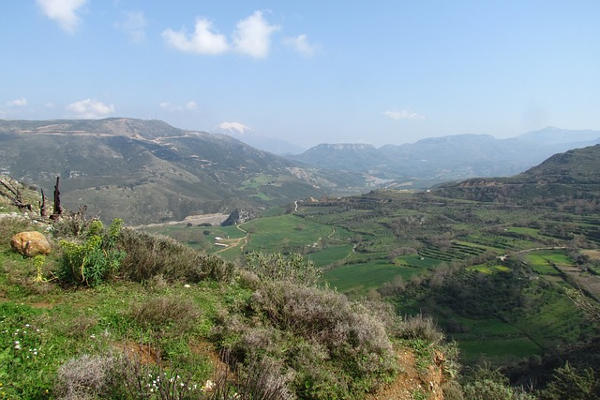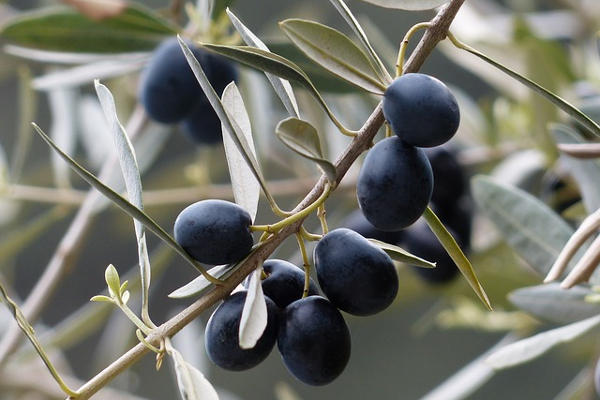that has retained its rural origins.
An insight into rural Crete
Even today, cars have to slow down for herds of sheep and goats that occasionally block the roads in inland Crete. There may be less donkeys and mules these days, but they are still to be seen in Cretan villages. Hens often still run around freely, and their eggs are consequently fresh and delicious. What's more, at Christmas, some Cretans still keep their own turkeys.
Some Cretans even dedicate themselves to activities that have nearly died out, harvesting sea salt from the coasts, or climbing up the cliffs to harvest the Cretan medicinal herb 'diktamos'. Others have reinvented old trades, tending carob trees and using their pods. Still others have turned to relatively new fruits, and even grow avocados for organic cosmetics.
The fascination of Crete also lies in the fact that it has retained so much of its traditional rural origins.

The many greenhouses, especially on the coastal plains, are indeed of more economic significance. Small African bananas grow here, as well as tomatoes and cucumbers that are sold across Europe. They are also experimenting with exotic fruits - for example, kiwis. Sweet chestnuts flourish prolifically far to the west of Crete, and the best potatoes on the island come from the Lassithi Plateau: some are even organic. The Amari Valley to the west of Psiloritis is famous for its delicious cherries, oranges flourish everywhere closer to sea-level, and are sold in particularly large numbers by farmers right along the edge of the National Road towards Iraklio between Bali and Sissi.
Not only can you enjoy fruit and several vegetables truly fresh on Crete, but many farm houses and some women's co-operatives use them to make their own spoon sweets, called "Glyka tou koutaliou" in Greek. Traditionally, they are given to guests as a welcome, but they also taste great in tavernas and confectioners on yoghurt or with coffee. These days you can also buy them in beautiful jars to take home with you in many shops. The spoon sweets made from quince (cydonia) and bergamot oranges (Citrus bergamia) are particularly unusual: your taste buds will learn to love new delights. Meat doesn't always have to be fresh either: Cretans in particular love two varieties of cured meat: siglino and kapaki.
Trout breeding centres are also part of farming on Crete, in a broader sense. You can enjoy this delicious fresh-water fish right at the farm, straight from the water and professionally grilled. You will find them in Zaros on the southern slopes of Psiloritis, and very close to Georgioupolis in beautiful Argyroupolis. The 'Trenaki', the little narrow-gauge railway, even departs from there.
The Olive Harvest on Crete

Olive trees are very tourist friendly. They require next to no work from their owners between April and October, giving the Cretans time to take care of their guests. In return, the heaviest work of the season starts at the beginning of November. Before the economic crisis, people were happy to accept help from casual labourers from Eastern Europe. Today, as in times gone past, they prefer to rely on help from the neighbours.
First, the ground under the trees has to be freed from thick vegetation. Controlled burning helps, but real stoop labour is also needed. Moreover, the technical equipment has to be tested. Does everything still work? Or do they need to be oiled or repaired?
Afterwards, nets are spread out under the olive trees. Unlike in Corfu, for example, where people like to wait for the wind to shake the mature olives from the trees, the nets are not laid under all the trees at once to stay there all winter. Here, people shake the branches, and once the tree has been harvested, they can carry the net to the next one. In the past, people used wooden sticks to shake the branches. Today, the verga is mostly used: a stick that is hooked up to a generator and shakes electronically. Only table olives are plucked by hand.
The olives now fall into the net, together with many leaves. These are all collected up together, and usually packed into 50 kg bags. The filled sacks are taken to the olive mill, the 'elaiotrivio', at least every other day. If the olives are left for longer, they would become too acidic. At the mill the leaves are then separated from the fruit.
The price that a supplier obtains for his olives is heavily dependent on the international markets. Spain, in particular, slashes prices, because many young olive plantations have been established there, which can be harvested mechanically. Of course, the quality plays a role, which is especially dependent on the acidity of the fruit. 5 - 7 kg of olives are needed for a litre of oil. Farmers usually receive less than 3 euro per litre. Before the economic crisis, that was paid cash in hand. Today, the mills are only allowed to pay farmers by bank transfer for tax purposes.
For many Cretan families who own 100 trees or less, the market price means nothing. They use the oil themselves, share it with their relatives, and give it to those who need it. These families compensate the mill owners by payment in kind: the mill operators keep 10% of the oil which they can sell on themselves.
Work on the olive grove isn't over with the production and sale of the oil. Now a part of the trees must be pruned. Since olive trees only produce a good yield every second year, the farmers choose trees that had a good yield in the most recent harvesting season and prune only these. They won't produce much the following winter anyway.
Discover heavenly Crete for yourself
An island full of surprises
A holiday destination for bathing enthusiasts, nature lovers, hikers, and those interested in history and culture. Today, Crete is one of the most popular tourist destinations in the Mediterranean - cosmopolitan yet mysterious.
Popular hotels on the sandy beach
The Corissia Hotels are situated within the tranquil, picturesque village of Georgioupolis right on the sandy beach. An ideal seaside resort both to relax and explore the island, because that is just what holidays on Crete are all about.
Let yourself be pampered
 OUR BEST
OUR BEST